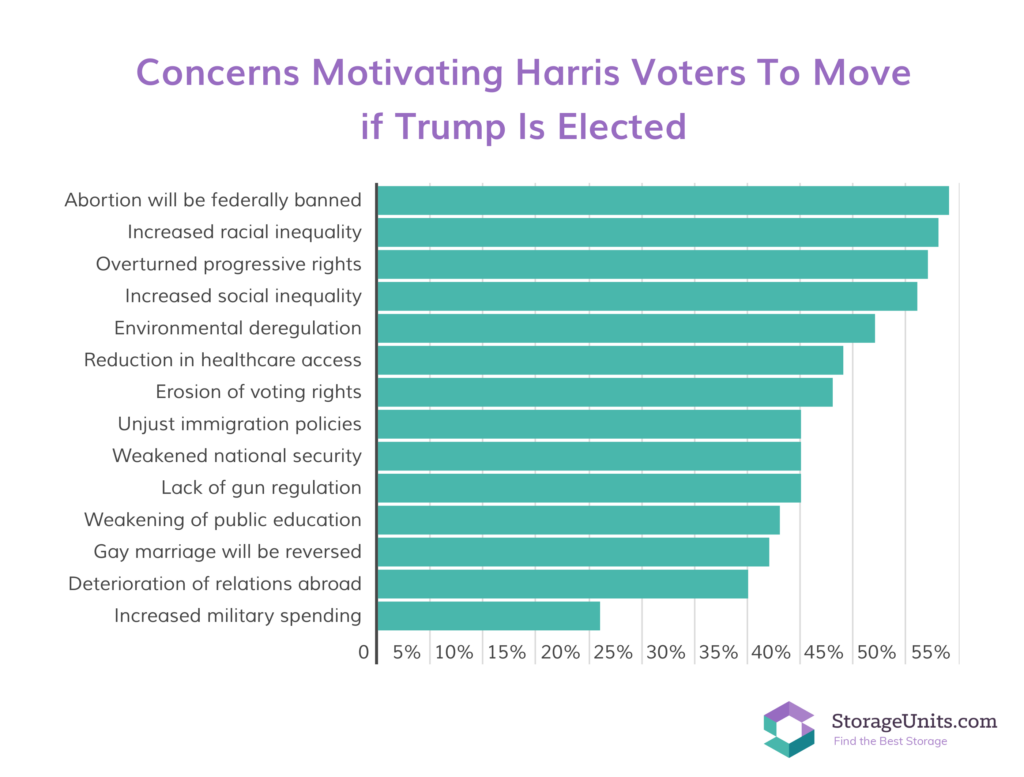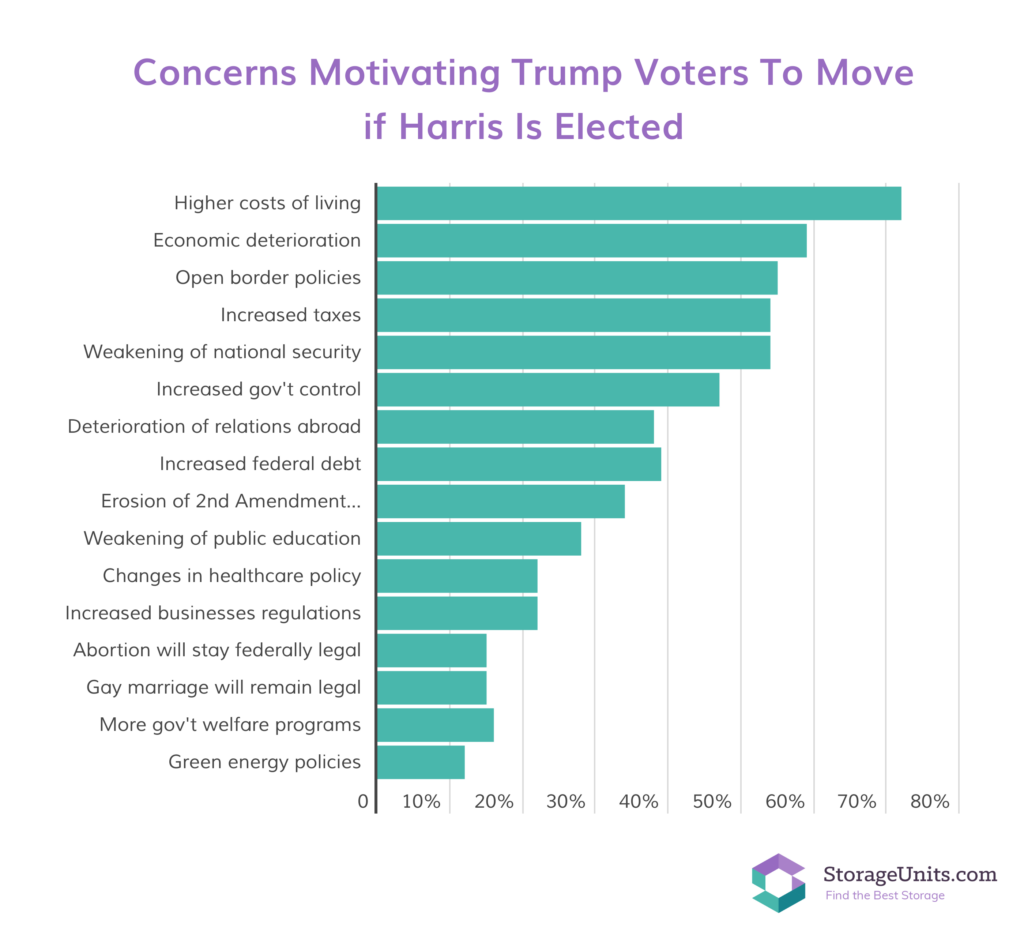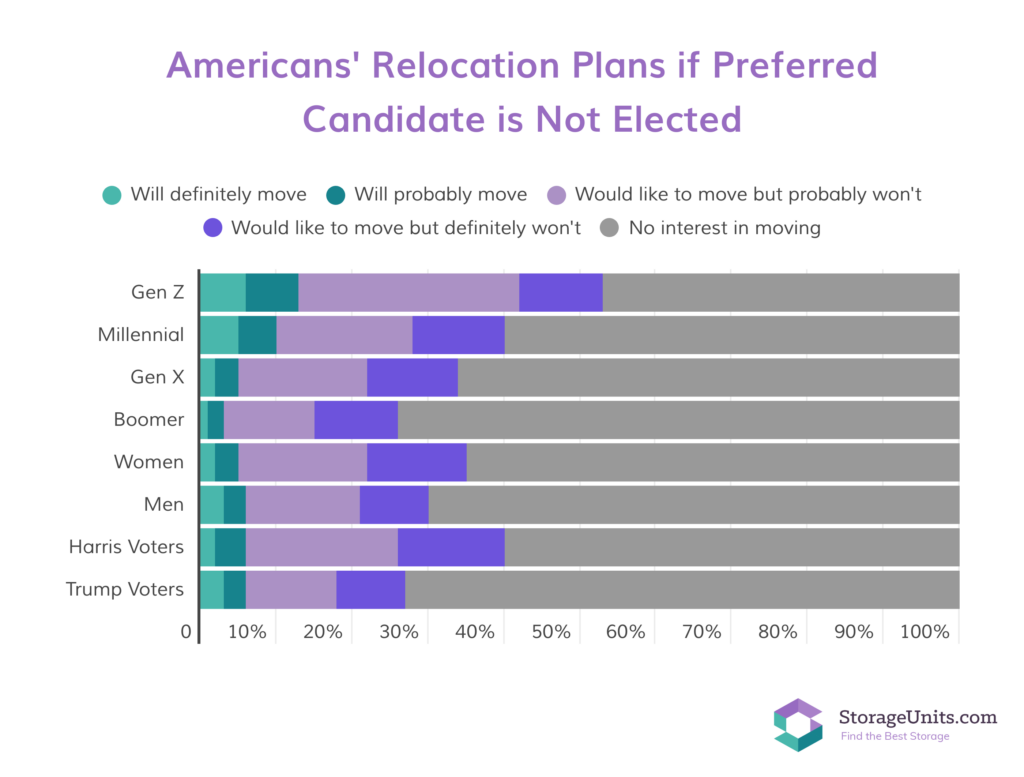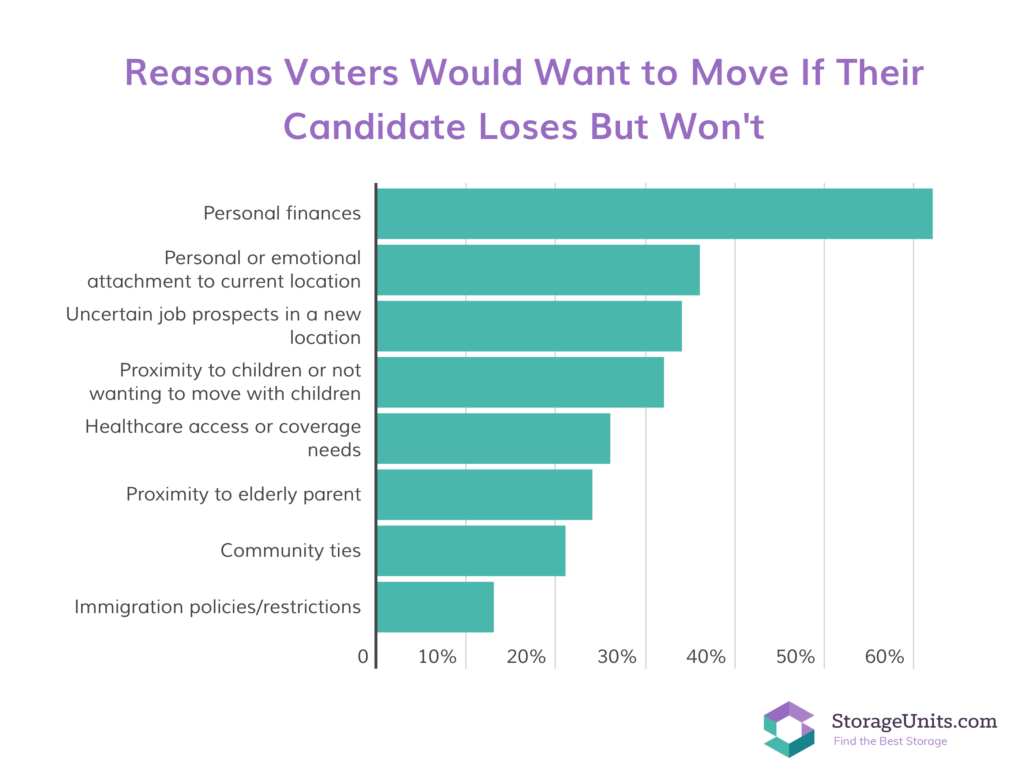1 in 3 Americans Want to Relocate If Their Presidential Candidate Loses
Written by: StorageUnits.com Editorial Team - Published: October 31, 2024
The week before the election, StorageUnits.com surveyed 2,955 U.S. citizens who plan to vote for either President Harris or President Trump in the 2024 presidential election to find out how likely Americans are to move if the candidate they vote for loses.
Our core insights:
- 34% of Americans want to relocate if the candidate they vote for loses
- 54% of Gen Zers want to move if their chosen candidate loses
- 36% of women would like to move vs. 30% of men
- Harris voters who will relocate if she loses are most concerned about a federal abortion ban, increased racial inequality, and overturning of progressive rights
- Trump voters who will relocate if he loses are most concerned about the higher cost of living, economic deterioration, and open border policies
4 in 10 Harris Voters Want to Move if Trump Wins the Election
Of Harris voters, 2% will definitely relocate to another state or country if Trump is elected, and 4% probably will. Another 34% would like to move but probably (20%) or definitely (14%) won’t.
The top three states respondents are considering moving to if Trump wins the presidential election are California (14%), Texas (9%), and Georgia (9%).
The top countries respondents are considering moving to if Harris does not win the presidential election are Canada (33%) and the United Kingdom (23%).
Abortion, racial inequality and the overturning of progressive rights are top concerns for Harris voters if Trump wins
The primary reasons respondents consider moving if Kamala Harris loses and Donald Trump wins include the potential for a federal abortion ban (54%), increased racial inequality (53%), and the overturning of progressive rights (52%).
Other significant concerns are increased social inequality (51%), environmental deregulation (47%), and reduced access to healthcare (44%).

“The division within the United States has become increasingly pronounced in recent years. This polarization is evident in the way people are aligning themselves with political ideologies, often to the extent of considering relocation. The reasons for this division are multifaceted, including differing views on social issues, economic policies, and governance styles. This polarization is not just a political phenomenon but also a social one, affecting how communities interact and how individuals perceive their place within the country,” says Real Estate Expert James Heartquist.
1 in 4 Trump Voters Want to Move if Harris Wins the Election
Of Trump voters, 3% will definitely relocate to another state or country if Harris is elected, and 3% probably will. Another 21% would like to move but probably (12%) or definitely (9%) won’t.
The top three states respondents are considering moving to if Harris is elected are Florida (18%), Texas (13%), and Tennessee (12%).
The top countries respondents are considering moving to if Trump does not win the presidential election are Canada (32%) and the United Kingdom (23%).
“The stakes of the 2024 election are incredibly high. The outcome will shape the country’s direction on critical issues such as climate change, healthcare, immigration, and economic inequality. The polarization is so intense that some Americans are willing to uproot their lives to live in a place that aligns more closely with their political beliefs. This election is not just about choosing a leader but about deciding the future trajectory of the nation. The policies and decisions made by the next administration will have long-lasting impacts on various aspects of life, including the economy, social justice, and international relations,” says Heartquist.
Economy and immigration top concerns for Trump voters if Harris wins
The primary reasons respondents consider moving if Donald Trump loses and Kamala Harris wins include higher costs of living (72%), economic deterioration (59%), and open border policies (55%).
Other significant concerns are increased taxes (54%), weakening of national security (54%), and increased government control over private life (47%).

Gen Zers Most Likely to Want to Move
Among generations, Gen Z is the most likely to be planning to move or to ideally want to move, even if they acknowledge it may not be feasible.
Men are slightly more likely than women to be planning a move if their preferred candidate loses, while women are more likely to express a desire to move that they recognize they cannot or will not act on.
A similar pattern appears among Trump and Harris voters: Trump voters are more likely to state that they will definitely or probably move if he loses, whereas Harris voters are more inclined to say they would like to move in theory but likely will not.

Personal Finances and Job Prospects Hold Some Back From Moving
For Americans who expressed a desire to move but are unlikely to do so, several factors are holding them back.
The primary factors include personal finances (62%), personal or emotional attachment to their current location (36%), and uncertain job prospects in a new location (34%). Other significant reasons are proximity to children (32%), healthcare access or coverage needs (26%), and proximity to elderly parents (24%).

1 in 7 Voters Contemplating a Move Have Already Rented a Storage Unit
Among those considering moving if their preferred candidate is not elected, 43% have researched getting a storage unit, and 15% have already secured a storage unit.
“The real estate market is likely to be significantly impacted by this political migration. First, we can expect regional shifts in population as people move to states that align with their political views. This could lead to increased demand in certain areas and decreased demand in others, potentially driving up property prices in politically favorable regions. Secondly, election years often bring uncertainty, which can lead to a temporary slowdown in the real estate market. Buyers and sellers may hesitate to make significant financial decisions until the political landscape is clearer. Lastly, policy changes proposed by presidential candidates can influence market sentiment. For example, changes in tax laws or housing regulations can affect home affordability and investment decisions,” adds Heartquist.
Methodology: This report is based on data from a survey commissioned by StorageUnits.com and conducted online via Pollfish. The survey included 2,955 U.S. citizens who plan to vote for either President Harris or President Trump in the 2024 presidential election.